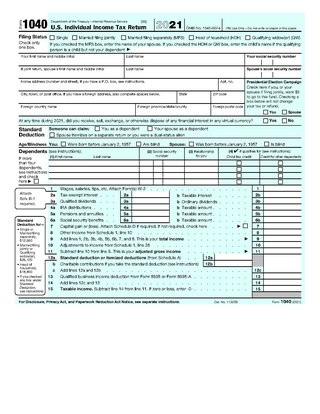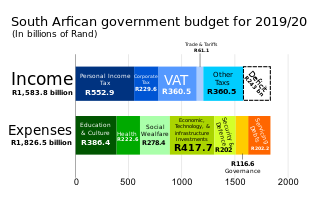
Form 1040, officially, the U.S. Individual Income Tax Return, is an IRS tax form used for personal federal income tax returns filed by United States residents. The form calculates the total taxable income of the taxpayer and determines how much is to be paid to or refunded by the government.

The United States of America has separate federal, state, and local governments with taxes imposed at each of these levels. Taxes are levied on income, payroll, property, sales, capital gains, dividends, imports, estates and gifts, as well as various fees. In 2020, taxes collected by federal, state, and local governments amounted to 25.5% of GDP, below the OECD average of 33.5% of GDP.
An income tax is a tax imposed on individuals or entities (taxpayers) in respect of the income or profits earned by them. Income tax generally is computed as the product of a tax rate times the taxable income. Taxation rates may vary by type or characteristics of the taxpayer and the type of income.

An offshore bank is a bank that is operated and regulated under international banking license, which usually prohibits the bank from establishing any business activities in the jurisdiction of establishment. Due to less regulation and transparency, accounts with offshore banks were often used to hide undeclared income. Since the 1980s, jurisdictions that provide financial services to nonresidents on a big scale can be referred to as offshore financial centres. OFCs often also levy little or no corporation tax and/or personal income and high direct taxes such as duty, making the cost of living high.

A taxpayer is a person or organization subject to pay a tax. Modern taxpayers may have an identification number, a reference number issued by a government to citizens or firms.

Taxation in Ireland in 2017 came from Personal Income taxes, and Consumption taxes, being VAT and Excise and Customs duties. Corporation taxes represents most of the balance, but Ireland's Corporate Tax System (CT) is a central part of Ireland's economic model. Ireland summarises its taxation policy using the OECD's Hierarchy of Taxes pyramid, which emphasises high corporate tax rates as the most harmful types of taxes where economic growth is the objective. The balance of Ireland's taxes are Property taxes and Capital taxes.
Income tax in Australia is imposed by the federal government on the taxable income of individuals and corporations. State governments have not imposed income taxes since World War II. On individuals, income tax is levied at progressive rates, and at one of two rates for corporations. The income of partnerships and trusts is not taxed directly, but is taxed on its distribution to the partners or beneficiaries. Income tax is the most important source of revenue for government within the Australian taxation system. Income tax is collected on behalf of the federal government by the Australian Taxation Office.
International taxation is the study or determination of tax on a person or business subject to the tax laws of different countries, or the international aspects of an individual country's tax laws as the case may be. Governments usually limit the scope of their income taxation in some manner territorially or provide for offsets to taxation relating to extraterritorial income. The manner of limitation generally takes the form of a territorial, residence-based, or exclusionary system. Some governments have attempted to mitigate the differing limitations of each of these three broad systems by enacting a hybrid system with characteristics of two or more.
Tax amnesty allows taxpayers to voluntarily disclose and pay tax owing in exchange for avoiding tax evasion penalties. It is a limited-time opportunity for a specified group of taxpayers to pay a defined amount, in exchange for forgiveness of a tax liability relating to previous tax periods. It typically expires when some authority begins a tax investigation of the past-due tax.

Income tax in India is governed by Entry 82 of the Union List of the Seventh Schedule to the Constitution of India, empowering the central government to tax non-agricultural income; agricultural income is defined in Section 10(1) of the Income-tax Act, 1961. Income-tax law consists of the 1961 act, Income Tax Rules 1962, Notifications and Circulars issued by the Central Board of Direct Taxes (CBDT), annual Finance Acts, and judicial pronouncements by the Supreme and high courts.
Tax deduction at source (TDS) is an Indian withholding tax that is a means of collecting tax on income, dividends, or asset sales by requiring the payer to deduct tax due before paying the balance to the payee.

Taxpayers in the United States may face various penalties for failures related to Federal, state, and local tax matters. The Internal Revenue Service (IRS) is primarily responsible for charging these penalties at the Federal level. The IRS can assert only those penalties specified imposed under Federal tax law. State and local rules vary widely, are administered by state and local authorities, and are not discussed herein.
An expatriation tax or emigration tax is a tax on persons who cease to be tax-resident in a country. This often takes the form of a capital gains tax against unrealised gain attributable to the period in which the taxpayer was a tax resident of the country in question. In most cases, expatriation tax is assessed upon change of domicile or habitual residence; in the United States, which is one of only three countries to substantively tax its overseas citizens, the tax is applied upon relinquishment of American citizenship, on top of all taxes previously paid. Australia has "Deemed disposal tax" which in essence is exit tax.

The Voluntary Disclosure of Income Scheme (VDIS) was a very unconventional but successful step among Indian economic policies. It would give an opportunity to the income tax or wealth tax defaulters to disclose their undisclosed income at the prevailing tax rates. This scheme would also ensure that the laws relating to economic offences would not be applicable for those defaulters. Over 350,000 people disclosed their income and assets under this scheme, which brought a revenue of ₹78 billion (US$980 million) to the Indian finance ministry. The scheme was closed on 31 December 1997. The Union Finance Minister P. Chidambaram hoped, "It is my faith that given a chance, the people of India (would) come clean of the black money."

In India, black money is funds earned on the black market, on which income and other taxes have not been paid. Also, the unaccounted money that is concealed from the tax administrator is called black money. The black money is accumulated by the criminals, smugglers, and tax-evaders. Around ₹22,000 crores are supposed to have been accumulated by the criminals for vested interests, though writ petitions in the supreme court estimate this to be even larger, at ₹900 lakh crores.

Taxation may involve payments to a minimum of two different levels of government: central government through SARS or to local government. Prior to 2001 the South African tax system was "source-based", where in income is taxed in the country where it originates. Since January 2001, the tax system was changed to "residence-based" wherein taxpayers residing in South Africa are taxed on their income irrespective of its source. Non residents are only subject to domestic taxes.

The Income Tax Department is a government agency undertaking direct tax collection of the government of India. It functions under the Department of Revenue of the Ministry of Finance. The Income Tax Department is headed by the apex body Central Board of Direct Taxes (CBDT). The main responsibility of the Income Tax Department is to enforce various direct tax laws, most important among these being the Income-tax Act, 1961, to collect revenue for the government of India. It also enforces other economic laws such as the Benami Transactions (Prohibition) Act, 1988, and the Black Money Act, 2015.
In Slovakia, taxes are levied by the state and local governments. Tax revenue stood at 18.732% of the country's gross domestic product in 2019. The tax-to-GDP ratio in the Slovakia increased by 0.4 percentage points from 34.3% in 2018 to 34.7% in 2019. The most important revenue sources for the state government are income tax, social security, value-added tax and corporate tax.
Pradhan Mantri Garib Kalyan Yojana, 2016 (PMGKY) is a scheme launched by the Narendra Modi led Government of India in December 2016 on the lines of the Income declaration scheme, 2016 (IDS) launched earlier in the year. A part of the Taxation Laws Act, 2016, the scheme provides an opportunity to declare unaccounted wealth and black money in a confidential manner and avoid prosecution after paying a fine of 50% on the undisclosed income. An additional 25% of the undisclosed income is invested in the scheme which can be refunded after four years, without any interest.
Taxation is an important part in the Turkish economy. Turkey has a 25.5% tax to GDP ratio. Most of the taxes are levied by central government. However some specific taxes are levied by municipalities, with the amount determined by centrally issued legislation. Municipalities have no authority to make their own tax laws.










